|
India Inc. is getting younger. The
basis for that sweeping statement is the fact that the panel Business
Today put together to identify India's hottest young executive talent,
a panel that comprised some of the best-known executive search firms
in the country, had no difficulty identifying 25 people under the
age of 40. The last time this publication embarked on a similar
exercise (See India's Hottest Young Executives, September 29, 2002),
the panel was hard-pressed to meet the age constraint, and eventually
extended the bar to 42. The times are responsible for the sudden
profusion of young executive talent-including reserves, our list
numbered almost 40-and, to flip the argument on its head, surely,
an economy that presents so many young people with an opportunity
to prove themselves cannot be anything but booming?
 RAJAGOPALAN
'BALKI' BALAKRISHNAN RAJAGOPALAN
'BALKI' BALAKRISHNAN
40/Executive Creative Director, Lowe
Movies Make The World Go Round
Lowe (previously Lintas) India was
supposed to be the advertising agency that attracted the best suits
and the best strategy-minds, not the finest creative pros. Until,
a bearded bear of a man who was expelled from Chennai's Guindy Engineering
College for playing cricket (an obsession with the gent) when he
should have been attending classes for the Master of Computer Applications
course in which he was enrolled. Soon, R. Balakrishnan was in Ahmedabad,
watching some 180 motion pics (another obsession) and participating
in some mind-exercises, all part of a six-month training programme
at Mudra Communications. Then came a seven-year stint at Mudra,
Bangalore, followed by a short stint at Lintas' Bangalore office.
Soon, he was asked to shift to a city he didn't really fancy, Mumbai,
and take over as Executive Creative Director. Ideas, not awards,
are all that matter for this son of a teacher and an insurance exec.
"Nothing can match the feeling (you get) when you know you
have got it right," he says. "You must be able to tell
in an instant what will work and what's junk." A creative animal
himself, Balki is focusing his energies at Lowe at (apart from writing
great copy), creating an environment that helps other creative pros
deliver their best. Leadership suits the man who loves spicy vegetarian
food. In the four-plus years he has headed creative at Lowe, he
claims, he has done some of his best work ever. And work is where
you are likely to find him. Unless a game of cricket is on.
-Abir Pal
 MUKESH
BUTANI MUKESH
BUTANI
National Director, Global Tax Practice, Ernst & Young
The Taxman Cometh
The man who was picked by international
tax Review as India's leading tax adviser (in September 2003, and
it is a Euromoney publication) could have so easily ended up a cricketer.
A smashed knee-cap cost Mukesh Butani a chance to play competitive
cricket, much to the relief of his parents-dad wanted him to join
the IAS and mom wanted him to be a lawyer. And so, the man who once
trained under the legendary Ramakant Achrekar (Sachin Tendulkar's
coach), and who, by his own admission "was never good in academics
in school" ended up with a commerce degree before coming in
24th in the national ca exams. By 31, he was a partner at Andersen.
The desire to become a tax expert was logical the way Butani sees
it. "There are two vital things in the world: life for which
you need a doctor, and money for which you need a taxman."
And so what if he couldn't play competitive cricket: the sport is
part of the very fabric of Butani's life. "I am biased towards
people who have played competitive sport," he says, referring
to his approach to hiring. "They are resilient, can work in
teams, and accept defeat."
-Amanpreet Singh
MADHABI PURI-BUCH
38/Country Head, Operations & Service Delivery, ICICI Bank
Seven in Seven
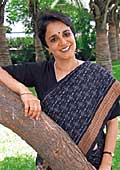 Seven
key assignments in seven years: that's Madhabi Puri-Buch's track
record at ICICI Bank. And it all began innocuously enough in 1997
when, as the head of research firm ORG MARG's financial research
division, she called on ICICI's Nachiket Mor (now Executive Director)
with a presentation on financial intermediaries. Mor was impressed
enough to call her the next day with a job-offer. Since then, the
gold medalist from Delhi's hoary St. Stephen's college and Indian
Institute of Management Ahmedabad alum has done it all: head of
corporate brand management, CEO of ICICI Capital Services (under
her, it became the largest distributor of mutual funds, sold a record
Rs 4,000-crore worth of ICICI bonds), CEO of ICICI Web Trade (again,
it became the leader with a 65 per cent share of the market), and
CEO of ICICI Home Finance (she grew the home loanbusiness seven
times in a year). Most of these achievements owe something to Puri-Buch's
mantra of ''zooming in'' to understand the business and ''zooming
out'' to get the big picture. When ICICI and ICICI Bank merged in
2002, the lady realised she knew little about banking; so, in keeping
with her ''zooming in'' philosophy she decided to learn all about
it by getting her hands dirty with operations. Another mantra followed-this
one says that people multiplied by processes raised to the power
technology equals customer value. Today, apart from operations and
service delivery, Puri-Buch heads transaction banking and technology
(corporate banking) and the brand management group. That's a bit,
and the high-flying mother of a 13-year-old boy is still zooming
in, zooming out. Seven
key assignments in seven years: that's Madhabi Puri-Buch's track
record at ICICI Bank. And it all began innocuously enough in 1997
when, as the head of research firm ORG MARG's financial research
division, she called on ICICI's Nachiket Mor (now Executive Director)
with a presentation on financial intermediaries. Mor was impressed
enough to call her the next day with a job-offer. Since then, the
gold medalist from Delhi's hoary St. Stephen's college and Indian
Institute of Management Ahmedabad alum has done it all: head of
corporate brand management, CEO of ICICI Capital Services (under
her, it became the largest distributor of mutual funds, sold a record
Rs 4,000-crore worth of ICICI bonds), CEO of ICICI Web Trade (again,
it became the leader with a 65 per cent share of the market), and
CEO of ICICI Home Finance (she grew the home loanbusiness seven
times in a year). Most of these achievements owe something to Puri-Buch's
mantra of ''zooming in'' to understand the business and ''zooming
out'' to get the big picture. When ICICI and ICICI Bank merged in
2002, the lady realised she knew little about banking; so, in keeping
with her ''zooming in'' philosophy she decided to learn all about
it by getting her hands dirty with operations. Another mantra followed-this
one says that people multiplied by processes raised to the power
technology equals customer value. Today, apart from operations and
service delivery, Puri-Buch heads transaction banking and technology
(corporate banking) and the brand management group. That's a bit,
and the high-flying mother of a 13-year-old boy is still zooming
in, zooming out.
-Roshni Jayakar
 MEENA
GANESH MEENA
GANESH
40/CEO, Tesco's Hindustan Service Centre
The Same All Over
Four times lucky. That is how Meena
Ganesh describes her work life. Then, the lady has always been different
(and not just in terms of appearance; she is 5'8" tall, a few
inches above the average for men of her generation). A peripatetic
entrepreneur-within organisations or while running her own start-up,
Customer Asset-Ganesh has played multiple roles that range from
coding to marketing to consulting to grooming a team. And she has
helped three companies, NIIT, Microsoft and Tesco, find their feet
in the Indian market and successfully started-up and sold a company
of her own apart from picking up some helpful consulting experience
during a three-year stint at PricewaterhouseCoopers. ''Start-up
DNA seems to be in my genes. I like the freedom and the challenges,''
says Ganesh. Not surprisingly then, the IIM Calcutta alum-she is
married to K. Ganesh, a batchmate and an entrepreneur in his own
right; he started up and sold one of India's first third party it
maintenance and networking services firm, IT&T-has always been
open to challenges, whether it be new jobs, or small things that
have little to do with her work life. ''I once challenged myself
to learn to play the keyboard,'' laughs Ganesh, who actually did
so in four months. ''Right now, my challenge is to learn Kannada.''
-Venkatesha Babu
MANISHA GIROTRA
34/managing Director, UBS Securities India
The Joy Of Winning
 Competition
begins at home for Manisha Girotra. The Delhi School of Economics
topper is a rainmaker for her investment bank, just as husband Sanjay
Agarwal is for his, Deutsche Bank. These days, the self-confessed
deal junkie who says she is happiest "when winning deals"
and her team of 50 are busy with armloads of cross-border deals
of the type that has become UBS' speciality. Before she signed on
with UBS, Girotra worked at ANZ Grindlays and BZW Investment Banking
(she led the team that won the GAIL privatisation deal and spent
11 months at BZW, London), but it is at UBS that the lady has come
into her own. That leaves the avid golfer-five years ago, she won
a prize for the longest drive at a Pro Am golf tournament organised
by this magazine-little time to indulge her pastime. Result? Her
handicap has slipped to 16; still, Girotra finds the time on Saturdays
to don an apron and attend RapidX cooking classes so that she can
bake a signature dish for her year-old daughter. That's not the
only thing cooking. Several deals are, and two ADR (American Depository
Receipts) issues are already on the stove. Competition
begins at home for Manisha Girotra. The Delhi School of Economics
topper is a rainmaker for her investment bank, just as husband Sanjay
Agarwal is for his, Deutsche Bank. These days, the self-confessed
deal junkie who says she is happiest "when winning deals"
and her team of 50 are busy with armloads of cross-border deals
of the type that has become UBS' speciality. Before she signed on
with UBS, Girotra worked at ANZ Grindlays and BZW Investment Banking
(she led the team that won the GAIL privatisation deal and spent
11 months at BZW, London), but it is at UBS that the lady has come
into her own. That leaves the avid golfer-five years ago, she won
a prize for the longest drive at a Pro Am golf tournament organised
by this magazine-little time to indulge her pastime. Result? Her
handicap has slipped to 16; still, Girotra finds the time on Saturdays
to don an apron and attend RapidX cooking classes so that she can
bake a signature dish for her year-old daughter. That's not the
only thing cooking. Several deals are, and two ADR (American Depository
Receipts) issues are already on the stove.
-Roshni Jayakar
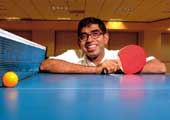 NARESH
GUPTA NARESH
GUPTA
37/Managing Director, Adobe India
Thriving On Discontinuity
Anyone who believes the truly-nerdy
cannot lead companies need only look as far as Naresh Gupta. Let's
prove the nerdy bit first: Gupta, who routinely turns up for work
in jeans and sneakers (and sometimes, a blazer), is a gold medallist
from Indian Institute of Technology, Kanpur, and a M.S. and Ph D
from the University of Maryland. His paper on Process Planning addressed
problems researchers had been grappling with for years and received
a honourable mention at the American Association of Artificial Intelligence
Conference and his doctoral dissertation on Motion Vision was nominated
for the Association of Computing Machinery Distinguished Dissertation
Award. "I worked on the foundation and then disappeared instead
of reaching for the obvious low-hanging fruit, so people must be
wondering who this obscure writer is," laughs Gupta. Adobe
India was born over a few days in 1998 when Gupta quit Adobe to
return to India (He was asked what it would take for him to continue
working for Adobe and famously answered "Adobe India").
In six years, the organisation has grown to a 300-person operation,
and Adobe PageMaker 7.0 was developed almost exclusively in India.
That's something.
-Amanpreet Singh
SAUGATA GUPTA
35/Head, Marketing, Marico Industries
Pushing The Right Lever(s)
 Failure
is a great motivator. Saugata Gupta had everything going for him:
a chemical engineering degree from Indian Institute of Technology,
Kharagpur, and a post-graduate diploma from Indian Institute of
Management, Bangalore. Yet, Gupta failed to land a job with a company
that is still hot on B-school campuses, Hindustan Lever Limited.
That hurt. "I think that spurred in me a desire to prove myself,
a feeling that lasted for five, six years," says Gupta. Hindustan
Lever's loss was Cadbury's gain. In the nine years he spent with
the chocolate maker, including a one-year stint at its famed Bourneville
plant, Gupta proved his mettle over and over again. The launch of
Perk wafer chocolates in 1995 is something he still remembers with
great pride. "I not only got my hands dirty, but learnt how
to effectively galvanise all the corporate resources.'' Soon "category
fatigue" set in and when he got a chance to head marketing
at ICICI Prudential in 2000, Gupta grabbed it. "Insurance was
just opening up; it was a chance to do something different.'' At
first the going was tough; financial services was a completely different
ball game . But over the three years Gupta spent at ICICI Prudential,
he did the rounds working in functions as varied as marketing, product
development, customer service and business intelligence. The big
chance came when Marico approached him late last year. Now, four
months into his new job, Gupta's brief is to create a buzz around
the company's products and take them to the "next level".
"Despite being a family-owned concern the degree professionalism
is amazing," says Gupta. And for the record, fulfilling his
brief may just help this avowed fan of India's cricket captain Sourav
Ganguly a chance to put one past Lever. Failure
is a great motivator. Saugata Gupta had everything going for him:
a chemical engineering degree from Indian Institute of Technology,
Kharagpur, and a post-graduate diploma from Indian Institute of
Management, Bangalore. Yet, Gupta failed to land a job with a company
that is still hot on B-school campuses, Hindustan Lever Limited.
That hurt. "I think that spurred in me a desire to prove myself,
a feeling that lasted for five, six years," says Gupta. Hindustan
Lever's loss was Cadbury's gain. In the nine years he spent with
the chocolate maker, including a one-year stint at its famed Bourneville
plant, Gupta proved his mettle over and over again. The launch of
Perk wafer chocolates in 1995 is something he still remembers with
great pride. "I not only got my hands dirty, but learnt how
to effectively galvanise all the corporate resources.'' Soon "category
fatigue" set in and when he got a chance to head marketing
at ICICI Prudential in 2000, Gupta grabbed it. "Insurance was
just opening up; it was a chance to do something different.'' At
first the going was tough; financial services was a completely different
ball game . But over the three years Gupta spent at ICICI Prudential,
he did the rounds working in functions as varied as marketing, product
development, customer service and business intelligence. The big
chance came when Marico approached him late last year. Now, four
months into his new job, Gupta's brief is to create a buzz around
the company's products and take them to the "next level".
"Despite being a family-owned concern the degree professionalism
is amazing," says Gupta. And for the record, fulfilling his
brief may just help this avowed fan of India's cricket captain Sourav
Ganguly a chance to put one past Lever.
-Abir Pal
 PRASOON
JOSHI PRASOON
JOSHI
34/National Creative Director, Mccann Erickson
The Meaning of Matlab
That this magazine, an avowed proponent
of eschewing the Vern in English-language publications should choose
to feature a headline with a Hindi word (Matlab, and it means er...means)
is testimony to the movement pioneered by Prasoon Joshi, an MBA
who has set the country's imagination afire with advertising incorporating
street-speak. "I think I am successful when my work becomes
part of people's lives and conversations," says Joshi who pens
Hindi poetry when not cracking out an ad or two. And so Thanda Matlab
Coca-Cola has become an ad anthem of sorts, and Joshi, a star. Not
that the last helps him at work. "Creative people do not look
up to anyone unless they deliver," he says. "You have
to lead by example." That he has done, restoring the flagging
creative sheen of McCann Erickson, and helping the agency bag accounts
such as LG, Pears, NDTV, and Dabur. And for all those struggling
to manage creative teams, the son of a civil servant and classical
music teacher has this advice: "With creative people the lines
between personal and professional space is blurred; we can't be
compartmentalised. Don't brush issues and problems under the carpet."
Joshi never does.
-Abir Pal
ZUBIN KARKARIA
36/Deupty CEO & Head, Business Development, Kuoni Travel
Group
The Traveller's Religion
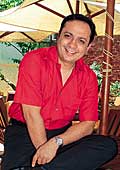 When
he was 12, Zubin Karkaria spent 45 days in a Parsi fire temple training
to be a priest. Even today the Bombay boy makes it a point to visit
the temple everyday on the way to work. Given the way his career
is progressing, the Gods are definitely smiling on Karkaria. Growing
up in Dadar's Parsi colony, Karkaria's first brush with what would
become his future profession came when in college. "My friend
had a travel agency, Orbit Travels, and before and after college
I used to hang around there." After joining SOTC, he was sent
by the company for an executive management programme, conducted
by the National University of Singapore in association with Stanford
University, and cut his teeth in the Trade Fairs unit taking delegations
across Europe. This was followed by stints in the then fledgling
Incentives & Conferences division, which organised large corporate-
and dealer- trips, and in the cash-cow packaged tours business.
Along the way SOTC was acquired by global travel major Kuoni. It
was in the packaged tours business that Karkaria really came into
his own. He came up with a buy-now-pay-later concept for holidays.
"A detailed survey of the market told us that while many people
were eager to travel abroad, the upfront cash required put them
off," elaborates Karkaria. Today a tenth of Kuoni's 30,000
package tour customers opt for this scheme. Once upon a time, Karkaria
used to polish vintage motorbikes to unwind; these days he prefers
to unearth un-spoilt wildlife reserves. We can spot a logical extension
of his business there. When
he was 12, Zubin Karkaria spent 45 days in a Parsi fire temple training
to be a priest. Even today the Bombay boy makes it a point to visit
the temple everyday on the way to work. Given the way his career
is progressing, the Gods are definitely smiling on Karkaria. Growing
up in Dadar's Parsi colony, Karkaria's first brush with what would
become his future profession came when in college. "My friend
had a travel agency, Orbit Travels, and before and after college
I used to hang around there." After joining SOTC, he was sent
by the company for an executive management programme, conducted
by the National University of Singapore in association with Stanford
University, and cut his teeth in the Trade Fairs unit taking delegations
across Europe. This was followed by stints in the then fledgling
Incentives & Conferences division, which organised large corporate-
and dealer- trips, and in the cash-cow packaged tours business.
Along the way SOTC was acquired by global travel major Kuoni. It
was in the packaged tours business that Karkaria really came into
his own. He came up with a buy-now-pay-later concept for holidays.
"A detailed survey of the market told us that while many people
were eager to travel abroad, the upfront cash required put them
off," elaborates Karkaria. Today a tenth of Kuoni's 30,000
package tour customers opt for this scheme. Once upon a time, Karkaria
used to polish vintage motorbikes to unwind; these days he prefers
to unearth un-spoilt wildlife reserves. We can spot a logical extension
of his business there.
-Abir Pal
 RAVI
KRISHNAN RAVI
KRISHNAN
36/Managing Director, IMG TWI India & South Asia and
Senior International Vice President, IMG
Tennis, Anyone
He's played cricket with Shane Warne
and competed in the Australian Open. It seems only apt that Ravi
Krishnan, a Tamil from Australia heads the world's best-known sports
marketing agency, IMG, in India. In 1995, Krishnan was the youngest
of a four-man team sent by IMG to set up its Indian operations.
Starting off selling hospitality ( think boxes) for cricket series,
Krishnan quickly rose up the ranks, his eye for opportunity helping
IMG create several firsts. "In our business, timing is critical,"
he says. Over the past nine years IMG has organised some high-profile
sporting (the Tata Open tennis tournament) and fashion (Lakmé
India Fashion Week) events, and facilitated some of the biggest
deals in Indian sporting history (like Samsung's over Rs 20-crore
bid to be the title sponsor of the recently concluded India-Pakistan
cricket series). No other agency comes close.
-Roshni Jayakar
SHUBHA KULKARNI
37/Director, Human Resources, HP, India Software Operation (ISO)
Bring on the next crisis
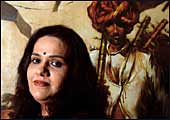 In
1989, when Shubha Kulkarni, a trained Carnatic musician and a masters
in social work from Delhi's Jamia Millia Islamia signed on with
HCL-hp (the two companies had a hardware manufacturing joint venture
in those days), she wasn't prepared for what she would face: appearances
on behalf of the company in labour courts, managing unionised workers,
and surviving the HCL culture that, as the lady recollects "expects
everyone to hit the ground running". Kulkarni enjoyed every
bit of it. In 1992, she moved to IBM as its fifth employee in India.
Her brief was to grow the company's (it then had a joint venture
with the Tata Group) software operations. "IBM had terrific
brand equity, but aligning compensation structures (to India), and
evolving best practices in hr for a multinational was a real upside."
In 1995, when IBM was a 1,000-person organisation, Shubha left and
signed on with hp. However, her life continued to be as filled with
key-events and challenges, including the hp-Compaq merger and the
synergisation of Digital Globalsoft with hp. Today, hp's software
operations is reported to be a 7,000-strong operation and Kulkarni
is looking to hire laterally (read: people with work experience).
And to keep an eye out for the next crisis. In
1989, when Shubha Kulkarni, a trained Carnatic musician and a masters
in social work from Delhi's Jamia Millia Islamia signed on with
HCL-hp (the two companies had a hardware manufacturing joint venture
in those days), she wasn't prepared for what she would face: appearances
on behalf of the company in labour courts, managing unionised workers,
and surviving the HCL culture that, as the lady recollects "expects
everyone to hit the ground running". Kulkarni enjoyed every
bit of it. In 1992, she moved to IBM as its fifth employee in India.
Her brief was to grow the company's (it then had a joint venture
with the Tata Group) software operations. "IBM had terrific
brand equity, but aligning compensation structures (to India), and
evolving best practices in hr for a multinational was a real upside."
In 1995, when IBM was a 1,000-person organisation, Shubha left and
signed on with hp. However, her life continued to be as filled with
key-events and challenges, including the hp-Compaq merger and the
synergisation of Digital Globalsoft with hp. Today, hp's software
operations is reported to be a 7,000-strong operation and Kulkarni
is looking to hire laterally (read: people with work experience).
And to keep an eye out for the next crisis.
-Venkatesha Babu
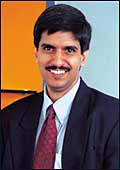 ASHISH
KUMAR ASHISH
KUMAR
40/Country Manager, IBM Global Services
Blue-blooded Lineage
Blue doesn't get any bigger than IBM.
picture this: in early 2004, hp bags an it services (read: outsourcing
of entire it requirements) contract from Bank of India for $150
million (Rs 675 crore). The deal is touted as the biggest-ever domestic
outsourcing contract and analysts wonder whether IBM has lost its
touch. The answer is measured and slightly slow in coming, but it
does. In April, IBM India announces that it has won a 10-year $750
million (Rs 3,375 crore) outsourcing contract from Bharti Tele-Ventures.
Scrupulously absent from the photo op when the deal was finally
inked was the quiet man responsible for the 18-month negotiation
process, Ashish Kumar, the Country Manager for IBM Global Services.
Kumar and IBM refused to speak to Business Today for this story,
but it is evident that the electrical engineer from Indian Institute
of Technology, Delhi and the management graduate from Indian Institute
of Management, Calcutta, is marked for bigger things within IBM
India. After all, the man and his team have ensured that IBM India
starts each of the next 10 years with revenues of $125 million (Rs
562.5 crore, and that's the value of the multi-year contracts it
has signed). Speaking to Business Today earlier, Kumar had said,
"These are large, annuity based long-term deals which involve
everything from consulting to system integration to application
development to deployment to routine maintenance. IBM has done this
internationally. We understand the entire generation of technologies."
Indeed, thanks to this deal and the acquisition of Daksh e-Services,
a business process outsourcing firm (this was acquired not by IBM
India or IBM Global Services, but the parent), Big Blue has been
the biggest tech story of the year thus far. And Kumar has scripted
at least part of that. part of that.
-Venkatesha Babu
PRATIK KUMAR
39/Corporate Vice President, HR, Wipro
Strength In Numbers
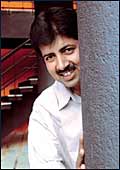 As
unflattering as this may be to the subject of this piece, it was
only when Wipro became the first company in the world to be assessed
at Level 5 of the People Capability Maturity Model (it is a model
developed by Carnegie Mellon University's Software Engineering Institute
and it really is a big deal, a very big deal) that people sat up
and noticed Wipro's hr, and the man behind it, Pratik Kumar. If
things had worked out differently, Kumar, who hails from a family
of doctors and engineers, would have been just another successful
example of the great Bihari dream, making it to the Indian Administrative
Service. While majoring in economics from Delhi University he saw
"people mindlessly cramming to become another nameless, faceless
bureaucrat". He hated it. Gradually, he drifted to hr and ended
up at XLRI, Jamshedpur for a two-year diploma. When he graduated,
he had the option of choosing between working for a multinational
he doesn't wish to name and HMT. He chose the latter. He spent a
year there and insists he learnt all about managing scale (HMT then
employed around 40,000). He spent the next two years at TVS Electronics.
The job was great, but it was based in Tumkur, a three-hour commute
from Bangalore. So, in 1992, when Wipro approached him, commuting-weary
Kumar had no hesitation in signing on. From 200 employees (Wipro
Systems) then, Kumar now oversees a workforce of 35,000 spanning
22 nationalities. ''Cross-cultural issues are something we work
on continuously," says Kumar. ''Excellence is a moving target
and we want to be the best.'' The man considers it ''a honour''
a run the hr function in an organisation that employs 35,000, but
wants to find out whether he has it in him to do other things as
well. "I would love to have cross-functional expertise,"
he says. As
unflattering as this may be to the subject of this piece, it was
only when Wipro became the first company in the world to be assessed
at Level 5 of the People Capability Maturity Model (it is a model
developed by Carnegie Mellon University's Software Engineering Institute
and it really is a big deal, a very big deal) that people sat up
and noticed Wipro's hr, and the man behind it, Pratik Kumar. If
things had worked out differently, Kumar, who hails from a family
of doctors and engineers, would have been just another successful
example of the great Bihari dream, making it to the Indian Administrative
Service. While majoring in economics from Delhi University he saw
"people mindlessly cramming to become another nameless, faceless
bureaucrat". He hated it. Gradually, he drifted to hr and ended
up at XLRI, Jamshedpur for a two-year diploma. When he graduated,
he had the option of choosing between working for a multinational
he doesn't wish to name and HMT. He chose the latter. He spent a
year there and insists he learnt all about managing scale (HMT then
employed around 40,000). He spent the next two years at TVS Electronics.
The job was great, but it was based in Tumkur, a three-hour commute
from Bangalore. So, in 1992, when Wipro approached him, commuting-weary
Kumar had no hesitation in signing on. From 200 employees (Wipro
Systems) then, Kumar now oversees a workforce of 35,000 spanning
22 nationalities. ''Cross-cultural issues are something we work
on continuously," says Kumar. ''Excellence is a moving target
and we want to be the best.'' The man considers it ''a honour''
a run the hr function in an organisation that employs 35,000, but
wants to find out whether he has it in him to do other things as
well. "I would love to have cross-functional expertise,"
he says.
-Venkatesha Babu
 ROHIT
KUMAR ROHIT
KUMAR
36/COO, Energy & Utilities, Wipro Technologies
Rainmaking, The Old-fashioned Way
Get a job you love and you will never
have to work a day. Thus Spake Confucius. Rohit Kumar has clearly
taken that to heart. The man's zest is writ large on his face and,
fortunately for Wipro, it has translated into success of the greenback
variety: in two years, Kumar has more than doubled the size of the
company's Energy & Utilities practice to $120 million from $50
million. Like most young professionals, Kumar is quick to attribute
the success to the entire team (which again, has doubled in size
to 1600 in the same period). Still, it is a well-known fact in tech
circles that it was Kumar who identified the global energy management
practice of American Management Systems as an ideal acquisition
target for Wipro, sold the story within the organisation, and steered
the integration process. Today it research firm Gartner reckons
Wipro is among the top 10 global it service providers in the energy
and utilities domain. Well, Wipro's gain is Infosys' loss in this
case. In early 2002, when Kumar, a University of Roorkee (now IIT
Roorkee and Kumar hates the place) and Wharton School alumnus wished
to leave the Valley-he set up the internet products group for Oracle;
earlier, he worked with Andersen Consulting (now Accenture) and
Boston Consulting Group-he was juggling offers from Bangalore's
glimmer twins. "I was attracted to Wipro's vision of an Indian
company becoming a global heavyweight," says Kumar. The avid
squash player is sure helping that cause.
-Venkatesha Babu
SANJIV LAMBA
39/Managing Director, BOC India
The Four-Year Itch
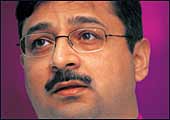 One
day in 1989, Sanjiv Lamba, a young socially aware-he founded Motivation,
an anti-drug movement while still at college-chartered accountant
and a commercial assistant at Lipton India interviewed with two
companies ITC, and Indian Oxygen (BOC's precursor). The first promised
to get back to him; the second offered him a job on the spot. And
so it was that Lamba found himself doing "all the things no
one wanted to do, including photocopying documents and fetching
coffee for the bosses." Still, the company's work-group orientation
meant the young accountant got to work with senior managers. One
day in 1989, Sanjiv Lamba, a young socially aware-he founded Motivation,
an anti-drug movement while still at college-chartered accountant
and a commercial assistant at Lipton India interviewed with two
companies ITC, and Indian Oxygen (BOC's precursor). The first promised
to get back to him; the second offered him a job on the spot. And
so it was that Lamba found himself doing "all the things no
one wanted to do, including photocopying documents and fetching
coffee for the bosses." Still, the company's work-group orientation
meant the young accountant got to work with senior managers.
Over the next three-and-a-half years Lamba impressed the senior
management enough to earn a two-year stint at the UK parent of the
company, and off to London he went, wife (college-sweetheart Usha)
and one-month-old son in tow. He spent the first year in internal
audit and the second in corporate finance, backpacked across Europe
with his family, and filled up on theatre. "I learnt a lot
about gases and developed a world view that went beyond the accounts
department of the company," says Lamba. BOC Plc was pleased
enough with his efforts to extend his stint by two years, When he
returned to BOC India as General Manager, Finance in 1997, the company's
finances were in a mess. He was named Director, Finance, in January
2000. "In March that year, we announced an annual loss of Rs
40 crore and wrote off Rs 79 crore... hardly a good omen,"
he grins. He worked on overhauling the systems and "embedding
new control mechanisms in processes". BOC India clawed its
way back into the black. Late in 2001 came an offer from BOC Plc
to shift to Japan as Director, Finance; then, BOC India decided
to appoint him MD. Lamba was the 36-year old CEO of a company where
the average age of the employees was 43. He went out and bought
a book, How To Act Like A CEO, but realised that it made no sense.
And so he decided to follow his instinct, creating "an organisational
vision, establishing goals, and measuring performance" at the
macro level and "drilling the importance of cash" at the
micro. Today, the company is again regarded as a blue chip. So where
does he go from here? There's a buzz about a bigger role for Lamba
in BOC's global operations. But the man himself is not saying anything.
"If you look at my career, I've typically had four-year stints.
I'll have spent four years on this job next year. Let's see what
happens then..."
-Arnab Mitra
 ASHOK
MITTAL ASHOK
MITTAL
35/Director & Co-Head, Investment Banking, HSBC
Urge to Merge
If it's difficult to find investment bankers with hobbies is
it because:
A: They don't have too much of time?
B: They get their jollies on the job itself?
C: They'd rather not talk about their hobbies because they'd
make readers blush?
You wish the answer was c but, rather
disappointingly, it's A. And perhaps a bit of B, as Ashok Mittal
will testify. Whenever he isn't travelling-three days a week-he's
doing 12-13 hour stretches. "There's plenty of excitement and
glamour, but it's also hard work," quips Mittal, who's been
doing mergers and acquisitions along with equity-raising for 12
years now, six of those at Lazard Capital. Mittal was at the forefront
of India's "first real disinvestment," of IBP. If he's
disappointed with the new government's policy of not meddling with
profitable psus-hsbc after all has (or should that be 'had') the
mandate for the disinvestment of Hindustan Petroleum-Mittal isn't
showing it. He'd rather look forward to the privatisation that's
on the anvil, of, for instance, airports: HSBC is the financial
advisor for the 50:50 JV formed between Sunil Mittal's Bharti group
and Changi Airport of Singapore to bid for the modernisation of
the Delhi and Mumbai airports.
Mittal, whose team is at any given time working on 10-12 "fairly
active" transactions, also expects M&As to pick up in cement,
telecom and pharma. And he's hopeful of foreign investment picking
up in industries like power. If that happens, 12 hours at the office
would provide Mittal with the kind of buzz that even bungee jumping
or para-gliding can't.
-Brian Carvalho
PANKAJ MITTAL
37/Director, Human Resources, Asia Pacific, DELPHI
Crossing The Ts
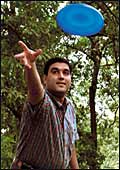 The
very fact that Pankaj Mittal is now trying to staff Delphi's China
operations with the right people is a measure of the man's success.
So, the "strict vegetarian" travels 25 days a month all
over Asia, works 15 hour days and smiles-he should-about the fact
that he has "an extremely understanding family." Mittal
believes in details, a trait he picked up at the Usha Shriram Group-he
signed on as a trainee and worked with it for seven years on a hotel
project, doing everything from buying the land to recruiting people-before
he took a sabbatical for a degree in law, a certification in cost
accounting, and a MBA (from Delhi's Faculty of Management Studies).
True to form, he started as plant human resources manager at Delphi
eight years ago and worked his way up. Today, 80 per cent of the
firm's 1,300-strong workforce has been hired by him. Not too many
hr managers can make that kind of claim. The
very fact that Pankaj Mittal is now trying to staff Delphi's China
operations with the right people is a measure of the man's success.
So, the "strict vegetarian" travels 25 days a month all
over Asia, works 15 hour days and smiles-he should-about the fact
that he has "an extremely understanding family." Mittal
believes in details, a trait he picked up at the Usha Shriram Group-he
signed on as a trainee and worked with it for seven years on a hotel
project, doing everything from buying the land to recruiting people-before
he took a sabbatical for a degree in law, a certification in cost
accounting, and a MBA (from Delhi's Faculty of Management Studies).
True to form, he started as plant human resources manager at Delphi
eight years ago and worked his way up. Today, 80 per cent of the
firm's 1,300-strong workforce has been hired by him. Not too many
hr managers can make that kind of claim.
-Amanpreet Singh
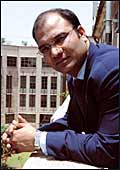 PANKAJ
RAZDAN PANKAJ
RAZDAN
35/Managing Director, Prudential ICICI AMC
All Fun(ds) and Games
When he isn't deciding how and where
to deploy some Rs 15,000 crore of investor wealth Pankaj Razdan
is either working out (45 minutes post 10 p.m.) or learning Hindi
classical music, or partying (on weekends) at Mumbai hotspots like
Enigma and Rock Bottom. But as Managing Director of Prudential ICICI-an
asset management company that's a 55:45 JV between Prudential Plc,
a UK insurance company, and ICICI Bank-Razdan is of course most
busy leading the charge of his mutual fund's 17-odd schemes in a
highly-competitive market that involves managing a total of some
Rs 160,000 crore (the total market size) of cash.
If that appears an awfully-huge stash, Razdan for his part isn't
exactly impressed. "That's peanuts. Penetration of MFs is still
just 0.03 per cent. We have barely scratched the surface."
To appeal to more consumers, a better understanding of their needs
is necessary, he adds.
Razdan is perhaps best placed to develop that insight, not because
he's a veteran of sorts in the fledgling mf sector but because of
the wealth of experience he's collected in Indian markets. And how!
In the early nineties, he chucked up a cosy engineering job at Tata
company Nelco, and plunged headlong into the stockmarkets. His timing
wasn't the best. A certain Harshad Mehta was running riot, and by
the time that artificial boom turned to bust, Razdan had "lost
a lot, but learnt even more."
If investors in Razdan's funds are getting a bit edgy by the first
half of that statement, a quick run through what he's been up to
since the Mehta-triggered bourses scandal should put them at ease:
He set up the Mumbai, Ahmedabad, and Delhi offices of Kale consultants
(today a major software products and services player), moved to
Pru ICICI in 1998 at inception time, took charge of sales and distribution
for the western region, in a couple of years moved on to head that
function nationally, took charge as deputy MD in 2003 and early
this year assumed charge as MD. Barely months into the hot seat,
and the fund was slammed for switching pf funds into equity. Razdan
acknowledges there was a fraud, but assures he's taken adequate
steps to ensure it doesn't happen again. If investors aren't impressed
by the action taken, they should for sure be by Razdan's transparency:
It's not often you find CEOs admitting frauds do happen at their
companies.
-Brian Carvalho
ARNAB SEN
31/Vice President & Business Head, Services & Solutions/Apollo
Health Street Ltd
Sangfroid in spades
 There
must be something different about a young man who walks away from
McKinsey & Company after an all-too-brief stint to be an entrepreneur.
There is and there isn't. The career of Arnab Sen, a "poet
at heart" and a "high risk taker", both by his own
admission, is typical up to a point: a degree in electrical engineering
from IIT, Delhi, followed by a diploma in business management from
Indian Institute of Management, Calcutta, and a campus placement
with McKinsey & Company (Sen came in second in a batch of 200).
The atypical part comes from his role models, people who have made
their mark in the world starting virtually from scratch and preferably
against all odds. That could explain why the consultant left the
Firm in early 2000 when he spotted an opportunity in the technology
side of the hospital services business. The result was Emedlife
Health Services, a company he co-founded with two colleagues and
with the Burman family that runs Dabur. There
must be something different about a young man who walks away from
McKinsey & Company after an all-too-brief stint to be an entrepreneur.
There is and there isn't. The career of Arnab Sen, a "poet
at heart" and a "high risk taker", both by his own
admission, is typical up to a point: a degree in electrical engineering
from IIT, Delhi, followed by a diploma in business management from
Indian Institute of Management, Calcutta, and a campus placement
with McKinsey & Company (Sen came in second in a batch of 200).
The atypical part comes from his role models, people who have made
their mark in the world starting virtually from scratch and preferably
against all odds. That could explain why the consultant left the
Firm in early 2000 when he spotted an opportunity in the technology
side of the hospital services business. The result was Emedlife
Health Services, a company he co-founded with two colleagues and
with the Burman family that runs Dabur.
In 2001, Apollo Hospitals acquired Emedlife and Sen became the
company's point man for initiatives in telemedicine, web solutions,
and other such technology services. "He inspires an element
of trust, faith and fairness," says Namit Agarwal, Vice President
and Head, Operations (BPO), Apollo Health Street. Agarwal should
know: he was Sen's batchmate at IIM-C and left a fast-track career
at Citibank to sign on with Emedlife. "He is cool at work,
yet has the ability to transform even a normal team into an aggressive
one." Sen, the son of a psychology-professor couple has already
worked on key healthcare informatics assignments for the Ministry
of it, World Health Organisation, the Government of Kerala. And
he lists engineer-MBA wife Swati Karkun Sen- "she probably
believes more in me than I myself do"-as a big help. Significant
other, significant support system.
-E. Kumar Sharma
 SUDIPTA
SEN SUDIPTA
SEN
32/Head, Marketing, Café Coffee Day
A Passion For Java
Growing up in Kolkata, all Sudipta
Sen Gupta wanted to be was an astrophysicist. She nearly became
one: after completing her bachelors degree in physics at the city's
Presidency College, she enrolled for the masters. Then came a year
of what she calls "soul-searching". She learnt German,
dabbled in theatre, and read anything she could lay her hands on.
It did not take long for Sen Gupta to realise that she wasn't cut
out for a career in research. So, she packed her bags and fled to
distant Delhi for a management degree from the Faculty of Management
Studies. Two years later, she was working for Coca-Cola India. "I
wanted to work for the biggest possible brand and it didn't get
any better than Coke," she recalls. For four years she cut
her teeth selling sugared water; then, in 2001, she quit to sign
on with Café Coffee Day, a retail chain promoted by a then-unknown
Bangalore firm, Amalgamated Bean Coffee Trading Company. "I
knew retail had great potential," says Sen Gupta simply, explaining
the rationale behind her move. Then, the company had 14 outlets
in five cities; today, it boasts 153 across 37. Much of the growth
has come from innovations introduced by Sen Gupta and her nine-member
team: merchandising, loyalty programmes, an in-café magazine,
and specialised formats such as book- and music-cafes. "A lot
can happen over coffee," say the business cards of all Café
Coffee Day employees. Sen Gupta, who likes to travel or whip up
Bengali delicacies for her husband, Marut, the Head of Confederation
of Indian Industry's Western India Operations, believes it can.
-Abir Pal
SANGITA SINGH
34/Vice President & Chief Marketing Officer, Wipro Technologies
Sold on selling
 Married
at 22, saleswoman for Borland, Adobe, and Microsoft products, sales
manager for Kerala and Karnataka, youngest vice president at Wipro
(and arguably, the first woman to hold down a senior position in
the still-slightly-old-fashioned company), chief marketing officer,
custodian of the global Wipro brand, mother.... phew! That's Sangita
Singh for you: dimunitive, almost frail in person, fast in speech,
and a bundle of energy in action. Not surprisingly, her stated goal
is to position Wipro among the top 10 it services brands in the
world. "There is no magic bullet," she says. "It
needs a series of small, incremental, yet very important things."
Well, if Wipro's now-ubiquitous appearance in the global press is
any measure the company is getting there, and Singh's hand is beginning
to show. Married
at 22, saleswoman for Borland, Adobe, and Microsoft products, sales
manager for Kerala and Karnataka, youngest vice president at Wipro
(and arguably, the first woman to hold down a senior position in
the still-slightly-old-fashioned company), chief marketing officer,
custodian of the global Wipro brand, mother.... phew! That's Sangita
Singh for you: dimunitive, almost frail in person, fast in speech,
and a bundle of energy in action. Not surprisingly, her stated goal
is to position Wipro among the top 10 it services brands in the
world. "There is no magic bullet," she says. "It
needs a series of small, incremental, yet very important things."
Well, if Wipro's now-ubiquitous appearance in the global press is
any measure the company is getting there, and Singh's hand is beginning
to show.
-Venkatesha Babu
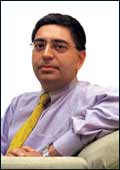 PRANEET
SINGH PRANEET
SINGH
37/Director, Sales & marketing, Nicholas Piramal
Far From Mechanical
If there was more happening in the
auto sector when I graduated, I wouldn't have ever left my core
area of mechanical engineering," laughs Praneet Singh, a graduate
from Indian Institute of Technology, Delhi, and an auto- and aeroplane-enthusiast.
Well, he did, and the results have been nothing short of the spectacular:
A post-graduate diploma from IIM C, stints at Godrej Soaps and P&G,
and seven years at McKinsey & Company (where, among other things,
he gained insights into the US, Latin American and South African
markets). In late 2003, Singh moved to Nicholas Piramal, and is
likely to be there (or at least in the industry) for the next five
years. "You need to last at least five years in an industry
to have any kind of impact," he says, interjecting that his
choice of companies is driven by "the people there". Well,
the man himself is said to have some skills in the 'people' domain.
"(He is) an outstanding leader of people," says Rajat
Gupta, Principal, McKinsey & Co. He will have enough opportunities
to prove that at Nicholas Piramal.
-Priya Srinivasan
SUMANT SINHA
37/President (Corporate Finance), A.V. Birla Group
In-house Banker
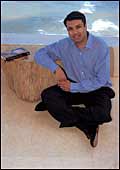 For
someone armed with a masters in international banking and finance
from Columbia University, and who's done stints with Citigroup and
ING Barings in New York before taking on the mantle of Corporate
Finance Head Honcho at the Rs 27,000-crore A.V. Birla Group, it
can't be very flattering to be known as son of a Finance Minister.
Or rather, as things stand today, the son of a former fm. A big
reason for that phenomenon could be that Sumant Sinha is still young
(37, in fact) . "And that (the fact that he is under 40) may
(also) be the biggest and only reason for me featuring in your list,"
chuckles Sinha, who maintains that he doesn't "carry it-that
he is Yashwant Sinha's lad-on my shoulders." For
someone armed with a masters in international banking and finance
from Columbia University, and who's done stints with Citigroup and
ING Barings in New York before taking on the mantle of Corporate
Finance Head Honcho at the Rs 27,000-crore A.V. Birla Group, it
can't be very flattering to be known as son of a Finance Minister.
Or rather, as things stand today, the son of a former fm. A big
reason for that phenomenon could be that Sumant Sinha is still young
(37, in fact) . "And that (the fact that he is under 40) may
(also) be the biggest and only reason for me featuring in your list,"
chuckles Sinha, who maintains that he doesn't "carry it-that
he is Yashwant Sinha's lad-on my shoulders."
What he does carry with oodles of responsibility and élan
is the corporate finance function at Kumar Mangalam Birla's companies-which
involves both external-facing functions like M&A and investor
relations as well as more inward-focused roles such as planning
and budgeting. Typically, the November-March period is when Sinha
has his hands full with the internal-facing oriented tasks thanks
to the fiscal year-end deadline. During the rest of the year, Sinha's
team pretty much functions as an in-house investment bank, sniffing
for acquisition opportunities, keeping in mind the mandates handed
out by the various business heads. "We assist if there is inorganic
growth to be done," (under)states Sinha.
Such "assistance" has been in ample display over the
two years Sinha has spent with the A.V. Birla Group. For one, Hindalco
has been transformed into a much larger company with a diversified
metals portfolio. For another, the acquisition of Larsen & Toubro
has propelled group company Grasim to leadership position in the
cement industry. Sinha clarifies he is always a part of a larger
team when working on such deals, which typically also includes the
head and the CFO of that particular business and the Chairman.
Sinha acknowledges the difference between working for an investment
bank and a corporation. "As a banker implementation doesn't
matter. Today, I have to live with the consequences of what I dictate."
He's doing that pretty well so far.
-Brian Carvalho
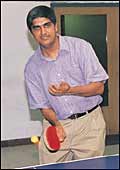 MURALI
SUBRAMANYAN MURALI
SUBRAMANYAN
40/Vice President, e-business Development, India Operations,
Oracle
Business As Usual
My job is not stressful," smiles
Murali Subramanian, confessing that he manages to steak an extended
40-minute luncheon break in a workday that is just a tad short of
12 hours. Still, there's no denying the fact that the graying-at-the-fringes
six footer who holds masters degrees in statistics and computer
science from Madras Christian College and the University of Texas,
El Paso, is key to Oracle's Indian and global strategy. Subramanian,
a table tennis enthusiast who loves a game with his colleagues-he
is ensuring that the company's new campus in Hyderabad, where he
is based, "will have plenty of table tennis tables" cricket
nets, and a state-of-the-art gymnasium- heads the Hyderabad centre
that employs a sizeable portion of the total 5,000-plus staff of
Oracle India and is completely responsible for the company's e-business
development group. He deserves that 40-minute break.
-E. Kumar Sharma
ARUN TADANKI
33/CEO, Monster India
A Circle Sealed Thus
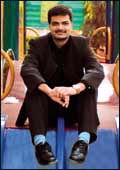 Not
too long ago, Arun Tadanki was the head of sales and marketing at
Jobs Ahead, a jobs portal (yup, it's a dotcom), the IIT Madras,
IIM Ahmedabad alum's second job after Nestle, where, among other
things, the built the Polo brand (he still nurses a Nestle hangover
and names former CEO Darius Ardeshir as a role model). He admits
he took too long to "figure out the market". He got a
second chance when he signed on with Monster India as its head.
There the movie-buff-he sometimes watches four movies back to back
and insists that he has no "flashy hobbies" like golf-learnt
all about growing profitably and managing by instincts. "I
am not interested in research; by the time it is done, the market
has already moved on," he says. Now that Monster has acquired
Jobs Ahead, the man who insists he has to learn to delegate more
has an opportunity to set the record right. He probably will. Not
too long ago, Arun Tadanki was the head of sales and marketing at
Jobs Ahead, a jobs portal (yup, it's a dotcom), the IIT Madras,
IIM Ahmedabad alum's second job after Nestle, where, among other
things, the built the Polo brand (he still nurses a Nestle hangover
and names former CEO Darius Ardeshir as a role model). He admits
he took too long to "figure out the market". He got a
second chance when he signed on with Monster India as its head.
There the movie-buff-he sometimes watches four movies back to back
and insists that he has no "flashy hobbies" like golf-learnt
all about growing profitably and managing by instincts. "I
am not interested in research; by the time it is done, the market
has already moved on," he says. Now that Monster has acquired
Jobs Ahead, the man who insists he has to learn to delegate more
has an opportunity to set the record right. He probably will.
-Amanpreet Singh
|
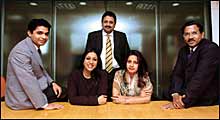 The
Panel That Chose The Hottest The
Panel That Chose The Hottest
(From left):
StantonChase's Venkatesh Shastry, Shilputsi's Purvi Sheth,
TransSearch's Atul Vohra, Accord's Sonal Agrawal, and Ma Foi's
K. Pandia Rajan
|
|
